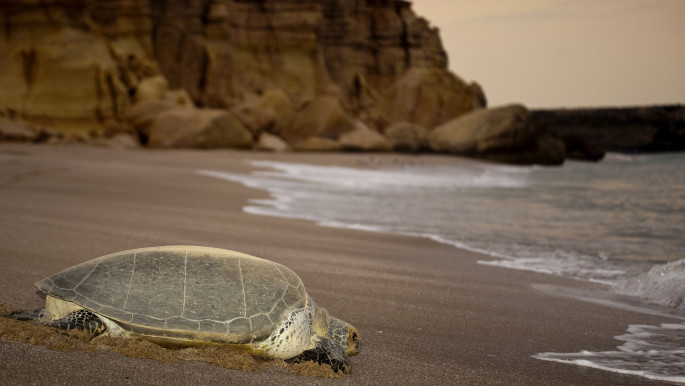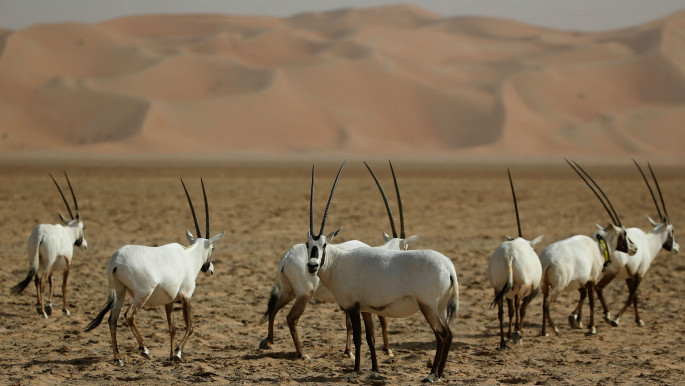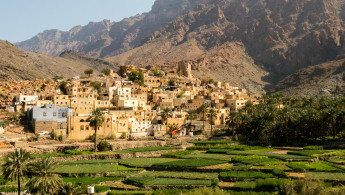A green future: Oman blazes a trail for environmentalism in the Arab world
Oman has long proved an outlier among the monarchies at the western edge of the Persian Gulf. Most Omanis subscribe to Ibadism, not Sunni Islam, and the Omani Sultan, Qaboos bin Said Al Said, has pursued a much quieter foreign policy than his counterparts in Qatar, Saudi Arabia, and the United Arab Emirates.
These examples of Omani independence extend even to the sultanate's environmental policy, which recognises that a region dependent on the petroleum industry needs to come to terms with climate change sooner or later. The rest of the Arabian Peninsula can learn a thing or two from Oman.
"The government of Oman has been quite active in thinking about the environment," said Dr Crystal Ennis, a lecturer at Leiden University focusing on political economy in the Gulf.
Sultan Qaboos' support for the environmental movement has deep, historical roots. Far ahead of its neighbours in the Gulf, Oman became the first country in the Middle East to enact a comprehensive environmental policy in 1982 and the first to establish an environmental ministry in 1984.
"Oman's interest in protecting its natural environment happened at the early stages of economic development," Dr Aisha al-Sarihi, a visiting fellow at the Arab Gulf States Institute who specialises in the Gulf monarchies' responses to global warming, told The New Arab.
"The law's main aim was to ensure that economic development did not expand at the expense of the natural environment."
In 1991, Oman and the United Nations Educational, Cultural, and Scientific Organisation, or UNESCO, began cosponsoring the UNESCO Sultan Qaboos Prize for Environmental Preservation.
The joint initiative furthers the work of research institutes and scientists dedicated to revolutionising the study of environmental protection with a biennial $70,000 grant.
Oman's decision to endow the programme may seem ironic for a sultanate that built its economy off fossil fuels, but Sultan Qaboos realises that climate change could very well define the future of the Gulf and the Arab world at large.
 |
Sultan Qaboos realises that climate change could very well define the future of the Gulf and the Arab world at large |  |
The Law on Conservation of the Environment and Prevention of Pollution, which Sultan Qaboos issued by royal decree in 2001, enshrines his decades long commitment to the environmental movement. The law includes penalties that act as effective deterrents for contributing to pollution.
Oman's relationship with the natural environment informs its approach to environmentalism. The sultanate boasts some of the most biodiverse, fragile ecosystems in the Middle East.
Oman hosts several endangered species, including the Arabian leopard, oryx, and tahr. Green, hawksbill, and loggerhead sea turtles nest on the sultanate's coasts. Omani officials have tried to encourage sustainable tourism to promote the beauty of the natural environment while protecting it.
 |
|
| Sea turtles nest on the sultanate's coasts [Getty] |
"The embrace of environmentalism among civil society and government bodies is critical for the preparation of Oman for a post-oil future," Ennis told The New Arab.
"Two aspects are especially important here: preparing legal and regulatory frameworks for safeguarding the environment and reducing harm and raising social awareness and changing consumer preferences and practices."
Omani Environment and Climate Affairs Minister Mohammad al-Toobi called on Omanis "to ensure that people visiting [their] country recognise the importance of the environment and preserve its natural diversity" in a 2018 interview with the UN Environment Programme, which praised Oman's embrace of sustainable tourism and involvement in the environmental movement as a whole.
 |
The law includes penalties that act as effective deterrents for contributing to pollution |  |
The Omani Environment and Climate Affairs Ministry's mission statement features a similar commitment "to protect the environment and conserve [Omanis'] natural resources," an important goal in a region on the front lines of global warming. Oman understands the need for environmentalism.
"The Omani government has already played a role in integrating civil society into environmental protection," noted al-Sarihi.
"Examples include the integration of environmental topics, such as climate change and the protection of Oman's biodiversity, into the education curriculum."
Civil society in Oman has also been taking its own steps. The Facebook page Clean Up Oman has organised volunteers to collect litter across the sultanate. The Environment Society of Oman promotes wildlife conservation throughout Oman and on Facebook, Instagram, and Twitter. An Omani aquarium even got in on the action by coordinating the clean-up of Duqm Port and Drydock with divers.
 |
|
| Read also: Hunting poachers, protecting the last of Oman's wild oryx |
"More generally, Oman and almost all other Arab countries could benefit greatly from combining electrical generation from abundant solar energy with energy storage and export, perhaps by using the electrical energy to produce hydrogen or synthetic hydrocarbon fuels suitable for export as liquids," said Dr Peter Kelemen, a geochemist at the Lamont–Doherty Earth Observatory who has studied the unique potential for carbon capture and storage in Oman.
"Such initiatives would take advantage of the Arabian Peninsula's huge solar resources and regional expertise in hydrocarbon engineering and export."
As desertification and other environmental issues threaten the heart of the Middle East, Oman has an opportunity to act as role model for Bahrain, Kuwait, Qatar, Saudi Arabia, and the UAE.
"The oil and gas-rich states of the Gulf cannot build their way out of the crisis with ever more air-conditioned towers like you see in Dubai, Doha, and Manama," said Dr James Russell, an associate professor of national security at the Naval Postgraduate School in Monterey whose research focuses on the politics of the Gulf.
"Oman should position itself as a leader – and lead."
The economies of Oman and its neighbours have flourished because of abundant access to fossil fuels. Nonetheless, the lifespan of the petroleum industry will reach its end in the twenty-first century, and Oman has taken the most significant steps in preparation for that inevitable event.
 |
The lifespan of the petroleum industry will reach its end in the twenty-first century, and Oman has taken the most significant steps in preparation for that inevitable event |  |
"Oman can position itself as a regional leader if it starts to make choices now to cope with sea level rise, higher temperatures, unpredictable weather, further reduced precipitation, and the prospect of displaced environmental refugees," Russell told The New Arab.
"Oman's approach should feature bottom-up and top-down measures, involving local communities and civic governance in combination with national-level emphasis. It must be a 'whole of government' approach."
All the Arab monarchies of the Gulf wield substantial financial resources. Qatar, Saudi Arabia, and the UAE have money to spare. If any of these countries engage with the environmental movement as Oman has, they can better mitigate the inevitable consequences of global warming. For his part, Sultan Qaboos has been preparing for the effects of climate change for over forty years.
"Oman has the opportunity to punch above its weight on this vital strategic issue," Russell told The New Arab. "The world needs countries like Oman to lead way by example."
Austin Bodetti studies the intersection of Islam, culture, and politics in Africa and Asia.
He has conducted fieldwork in Bosnia, Indonesia, Iraq, Myanmar, Nicaragua, Oman, South Sudan, Thailand, and Uganda. His research has appeared in The Daily Beast, USA Today, Vox, and Wired.


![President Pezeshkian has denounced Israel's attacks on Lebanon [Getty]](/sites/default/files/styles/image_684x385/public/2173482924.jpeg?h=a5f2f23a&itok=q3evVtko)



 Follow the Middle East's top stories in English at The New Arab on Google News
Follow the Middle East's top stories in English at The New Arab on Google News


